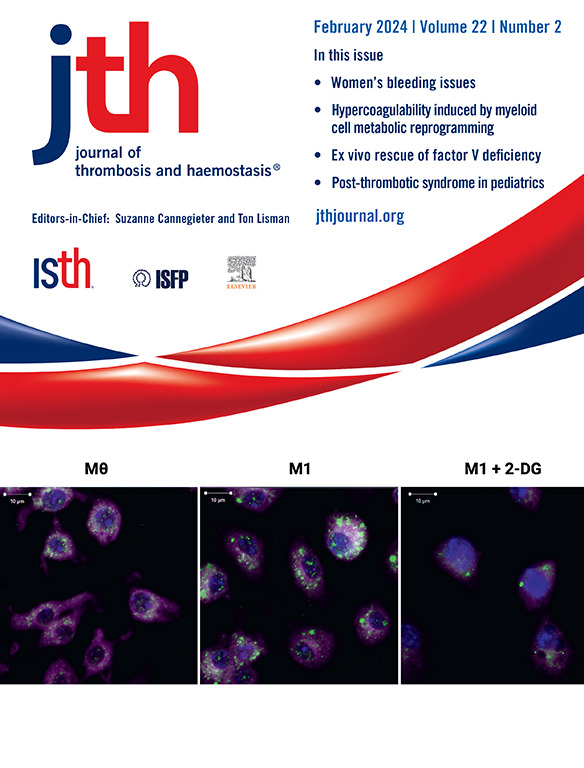房颤和血栓前基因型对缺血性脑卒中风险的共同影响。
IF 5.5
2区 医学
Q1 HEMATOLOGY
引用次数: 0
摘要
背景:房颤(AF)是缺血性脑卒中的主要危险因素。血栓前单核苷酸多态性(snp)是否影响房颤卒中风险尚不清楚。目的:探讨5种血栓前snp与房颤对缺血性脑卒中风险的共同影响。方法:从特罗姆瑟研究(1994-2012)和特朗德拉格健康研究(1995-2008)中随机抽取一个亚队列(n=14,583)。DNA基因分型rs8176719 (ABO血型)、rs6025 (Factor V Leiden;FVL), rs1799963(凝血酶原G20210A), rs2066865(纤维蛋白原γ;FGG)和rs2036914(因子11;季)。通过单个snp的房颤状态和遗传风险评分(GRS)的类别来估计突发缺血性卒中的95%可信区间(CI)的风险比(HR)。结果:1091名参与者在随访期间出现房颤,其中169名(15.5%)随后发生中风。凝血酶原、FVL、F11或FGG中有≥1个危险等位基因与房颤患者卒中风险增加无关。在没有房颤的情况下,ABO中有≥1个危险等位基因与卒中无关(HR 1.03, 95% CI 0.85-1.25),而有房颤且ABO中有≥1个危险等位基因的患者卒中风险比无房颤患者高1.4倍(HR 1.42, 95% CI 0.99-2.04)。在有或没有房颤的受试者中,不同GRS类别的卒中风险没有线性增加。结论:大多数血栓性SNPs与缺血性卒中风险无关,无论房颤状态如何。仅AF患者的ABO SNP与缺血性卒中风险相关。本文章由计算机程序翻译,如有差异,请以英文原文为准。
Joint effects of atrial fibrillation and prothrombotic genotypes on the risk of ischemic stroke
Background
Atrial fibrillation (AF) is a major risk factor for ischemic stroke. Whether prothrombotic single nucleotide polymorphisms (SNPs) impact stroke risk in AF is not well known.
Objectives
To investigate the joint effects of 5 prothrombotic SNPs and AF on ischemic stroke risk.
Methods
A subcohort (n = 14 583) was randomly sampled from the Tromsø (1994-2012) and the Trøndelag Health (1995-2008) studies. DNA was genotyped for rs8176719 (ABO blood type), rs6025 (factor [F]V Leiden), rs1799963 (prothrombin G20210A), rs2066865 (fibrinogen-γ), and rs2036914 (F11). Hazard ratios (HRs) with 95% CIs for incident ischemic stroke were estimated by AF status for individual SNPs and by categories of a genetic risk score.
Results
A total of 1091 participants developed AF during follow-up, of whom 169 (15.5%) subsequently had a stroke. Having ≥1 risk allele in prothrombin, FV Leiden, F11, or fibrinogen-γ was not associated with excess stroke risk in AF. In the absence of AF, ≥1 risk allele(s) in ABO was not associated with stroke (HR, 1.03; 95% CI, 0.85-1.25), whereas those with AF and ≥1 risk allele(s) in ABO had a 1.4-fold increased stroke risk compared with those with AF and no risk allele (HR, 1.42; 95% CI, 0.99-2.04). There was no linear increase in stroke risk across categories of the genetic risk score in participants either with or without AF.
Conclusion
Most prothrombotic SNPs were not associated with ischemic stroke risk, regardless of AF status. The ABO SNP was associated with ischemic stroke risk in those with AF only.
求助全文
通过发布文献求助,成功后即可免费获取论文全文。
去求助
来源期刊
CiteScore
24.30
自引率
3.80%
发文量
321
审稿时长
1 months
期刊介绍:
The Journal of Thrombosis and Haemostasis (JTH) serves as the official journal of the International Society on Thrombosis and Haemostasis. It is dedicated to advancing science related to thrombosis, bleeding disorders, and vascular biology through the dissemination and exchange of information and ideas within the global research community.
Types of Publications:
The journal publishes a variety of content, including:
Original research reports
State-of-the-art reviews
Brief reports
Case reports
Invited commentaries on publications in the Journal
Forum articles
Correspondence
Announcements
Scope of Contributions:
Editors invite contributions from both fundamental and clinical domains. These include:
Basic manuscripts on blood coagulation and fibrinolysis
Studies on proteins and reactions related to thrombosis and haemostasis
Research on blood platelets and their interactions with other biological systems, such as the vessel wall, blood cells, and invading organisms
Clinical manuscripts covering various topics including venous thrombosis, arterial disease, hemophilia, bleeding disorders, and platelet diseases
Clinical manuscripts may encompass etiology, diagnostics, prognosis, prevention, and treatment strategies.

 求助内容:
求助内容: 应助结果提醒方式:
应助结果提醒方式:


